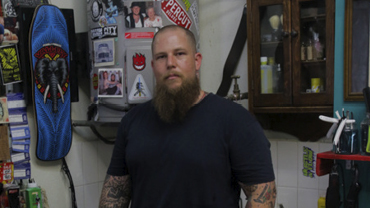At times, social stigma can make it difficult for men to talk about how they are doing and what they are feeling. Many men fear being perceived as week, vulnerable or 'not able to hack it' by others - especially their friends or family. We need to make it OK for men to talk more and open up.
What has helped me talk more freely about how I am doing is by building friendships and engaging in activities with other men - sometimes in 'men only groups' like our annual men's camping trip - and sometimes as part of family outings like picnics or family camping trips. The point is that by 'getting away' we can have conversations that may be more difficult in our normal daily settings. Telling the truth about what's going on in my life with friends who ask is another way of talking about how I'm doing. For example, my kids starting school brought renewed homework battles. A friend asked – how are things going? Instead of saying - 'fine,’ I said - "man, we had a homework battle the other night. It was a big bummer.” Then, he said, "that's funny we had one of those in our house too" and we proceeded to discuss the 'homework battles' and generated a few laughs about it. The honesty helped me to gain insight.
Sharing my experience with my friend, brings me to my next point about the importance of having a good listener around when you are willing to talk. I am lucky enough to have great listeners in my life. To me, good listeners are not judgmental and do not rush to provide answers or solutions. Good listeners ask questions that encourage the speaker to say more - so they ask open-ended questions. Good listeners focus on what the speaker is saying and not preparing their response to what the speaker is sharing. My wife has listened to some of my stories over and over again for 20+ years and she still mostly listens - I know that because if I miss a detail or two in a juicy story she's there to remind me. During my youth, I benefitted from my Mom's non-judgmental listening skills. She would listen to an entire story of mine before reacting. And today, I have several friends that I confide in and upon whom I can depend for honest and sometime humorous feedback.
To all of the men out there, be honest with your friends. Don't be afraid tell them the things that bother you or keep you up at night. Be there for one another, and make a point to connect in-person over every day activities. Ask them, 'dude, do you need a little time away from the house/family?’ Don't be afraid to ask your buddy to ride to Home Depot, get mulch or refill your propane tanks with you. Then, use that as an opportunity to talk about something or nothing at all.
And for those who want men to open up, first realize that many men may not want to leap right into a conversation about how they are doing. That must be respected. Men like to do stuff. To get a man to talk ask him to do something he likes to do, get him doing it and then use that as a potential opportunity to build the relationship and - if the man wants to - talk about how the man is doing. Ask a guy if he wants to go do something that he likes and you will not only lead him to the water – he will drink.
For 24 hour crisis support, contact a local service available in your country.
If life is in danger, call or go directly to emergency services.
Australia
Emergency services: 000
24 hour crisis support:
Lifeline, 13 11 14
Suicide Call Back Service, 1300 659 467
Austria
Emergency services: 112
24 hour crisis support:
Telefon Seelsorge, 142
Belgium
Emergency services: 100
24 hour crisis support:
Tele-Accueil, 107
Canada
Emergency services: 911
24 hour crisis support:
Canadian Association for Suicide Prevention
Association canadienne pour la prévention du suicide
Czech Republic
Emergency services: 155
24 hour crisis support:
Modra Linka, 549 241 010
Denmark
Emergency services: 112
24 hour crisis support:
Livslinien, 70201201
Finland
Emergency services: 112
24 hour crisis support:
Mieli, 010 195 202, 010 195 202
Emergency services: 000
24 hour crisis support:
Lifeline, 13 11 14
Suicide Call Back Service, 1300 659 467
Austria
Emergency services: 112
24 hour crisis support:
Telefon Seelsorge, 142
Belgium
Emergency services: 100
24 hour crisis support:
Tele-Accueil, 107
Canada
Emergency services: 911
24 hour crisis support:
Canadian Association for Suicide Prevention
Association canadienne pour la prévention du suicide
Czech Republic
Emergency services: 155
24 hour crisis support:
Modra Linka, 549 241 010
Denmark
Emergency services: 112
24 hour crisis support:
Livslinien, 70201201
Finland
Emergency services: 112
24 hour crisis support:
Mieli, 010 195 202, 010 195 202
France
Emergency services: 112
24 hour crisis support:
Suicide Ecoute, 0145 3940 00
Germany
Emergency services: 112
24 hour crisis support:
TelefonSeelsorge, 0800/1110111
Hong Kong
Emergency services: 999
24 hour crisis support:
Samaritans, 2896 0000
Ireland
Emergency services: 112 or 999
24 hour crisis support:
Pieta House, 1800 247 247
Samaritans, 116 123
Netherlands
Emergency services: 112
24 hour crisis support:
Sensoor, 0900 0767
New Zealand
Emergency services: 111
24 hour crisis support:
Lifeline, 0800 543 354
Suicide Crisis Helpline, 0508 828 865 (0508 TAUTOKO)
Norway
Emergency services: 112
24 hour crisis support:
Kirkens SOS, 22 40 00 40
Emergency services: 112
24 hour crisis support:
Suicide Ecoute, 0145 3940 00
Germany
Emergency services: 112
24 hour crisis support:
TelefonSeelsorge, 0800/1110111
Hong Kong
Emergency services: 999
24 hour crisis support:
Samaritans, 2896 0000
Ireland
Emergency services: 112 or 999
24 hour crisis support:
Pieta House, 1800 247 247
Samaritans, 116 123
Netherlands
Emergency services: 112
24 hour crisis support:
Sensoor, 0900 0767
New Zealand
Emergency services: 111
24 hour crisis support:
Lifeline, 0800 543 354
Suicide Crisis Helpline, 0508 828 865 (0508 TAUTOKO)
Norway
Emergency services: 112
24 hour crisis support:
Kirkens SOS, 22 40 00 40
Singapore
Emergency services: 995
24 hour crisis support:
Samaritans, 1800-221 4444
South Africa
Emergency services: 10177
24 hour crisis support:
Lifeline, 0861 322 322
Spain
Emergency services: 112
24 hour crisis support:
Telefono de la Esperanza, 902 500 002
Sweden
Emergency services: 112
Kyrkans Jourtjänst, 031-800 650
Switzerland
Emergency services: 144
24 hour crisis support:
Pars Pas, 027 321 21 21
UK
Emergency services: 999
24 hour crisis support:
Samaritans, 116 123
USA
Emergency services: 911
24 hour crisis support:
National Suicide Prevention Lifeline, 1-800-273-8255 (1-800-273-TALK)
Lifeline Crisis Chat
Emergency services: 995
24 hour crisis support:
Samaritans, 1800-221 4444
South Africa
Emergency services: 10177
24 hour crisis support:
Lifeline, 0861 322 322
Spain
Emergency services: 112
24 hour crisis support:
Telefono de la Esperanza, 902 500 002
Sweden
Emergency services: 112
Kyrkans Jourtjänst, 031-800 650
Switzerland
Emergency services: 144
24 hour crisis support:
Pars Pas, 027 321 21 21
UK
Emergency services: 999
24 hour crisis support:
Samaritans, 116 123
USA
Emergency services: 911
24 hour crisis support:
National Suicide Prevention Lifeline, 1-800-273-8255 (1-800-273-TALK)
Lifeline Crisis Chat









hirez.png)

